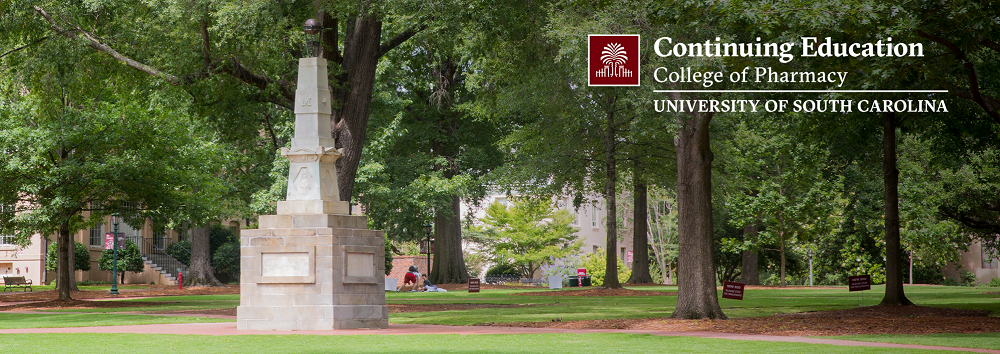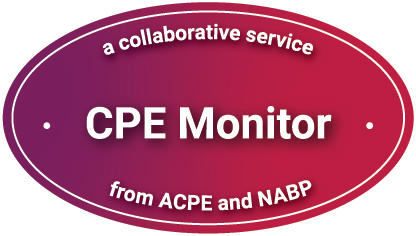
|
9:00 am-
10:00 am
|
Infectious Diseases Pharmacy 101: What you Really Need to Know about Bacteria and Antibiotics
Taylor Morisette, PharmD, MPH; Assistant Professor, Clinical Pharmacy and Outcomes Sciences, Medical University of South Carolina (MUSC) College of Pharmacy; Clinical Pharmacy Specialist, Infectious Diseases and Antimicrobial Stewardship, MUSC Shawn Jenkins Children's Hospital
ACPE UAN 0062-9999-22-029-L01-P/T
(1.0 credit hours, 0.1 CEU; knowledge-based)
Learning Objectives:
At the completion of this activity, the pharmacist and pharmacy technician will be able to:
|
|
10:00 am-10:15 am
|
Break
|
|
10:15 am-
11:15 pm
|
Acute Pain Management with Pharmacologic Therapies: A Balancing Act
Emmeline Tran, PharmD, BCPS; Assistant Professor, Medical University of South Carolina; Charleston, SC
ACPE UAN 0062-9999-22-031-L08-P/T
(1.0 credit hours, 0.1 CEU; application-based)
Learning Objectives:
At the conclusion of the program, the pharmacist will be able to:
At the completion of this activity, the pharmacy technician will be able to:
|
|
11:15 am-11:30 am
|
Break
|
|
11:30 am -
12:30 pm
|
Just Say No to Nitrosamines and Cigarettes
Emily Ware, PharmD; Clinical Pharmacy Specialist - Ambulatory Care, Medical University of South Carolina, Charleston, SC
ACPE UAN 0062-9999-22-032-L01-P/T
(1.0 credit hours, 0.1 CEU; application-based)
Learning Objectives:
At the completion of this activity, the pharmacist and pharmacy technician will be able to:
|
|
12:30 pm-
1:00 pm
|
Lunch
|
|
1:00 pm-
3:00 pm
|
New Drug Update 2021-2022
C. Wayne Weart, PharmD, BCPS, FASHP, FAPhA; Professor, MUSC College of Pharmacy
ACPE UAN 0062-9999-22-033-L01-P/T
(2.0 credit hours, 0.2 CEU; knowledge-based)
Learning Objectives:
At the conclusion of the program, the pharmacist will be able to:
At the completion of this activity, the pharmacy technician will be able to:
|
|
3:00 pm-
3:15 pm
|
Break
|
|
3:15 pm-
4:15 pm
|
A Review of Specialty Pharmacy Therapies for Migraines in Adults
Cole Swanson, PharmD, CDCES; Clinical Pharmacist - Neurology, MUSC Specialty Pharmacy, Charleston, SC
ACPE UAN 0062-9999-22-030-L01-P/T
(1.0 credit hours, 0.1 CEU; application-based)
Learning Objectives:
At the conclusion of the program, the pharmacist will be able to:
At the completion of this activity, the pharmacy technician will be able to:
|
|
4:15 pm-
4:30 pm
|
Wrap Up and Accessing CE Documentation
|
Date: Mar 19, 2022 09:00 AM - 04:30 PM
CE Hours
CE Units
Activity Type
- Knowledge-Based and Application-Based
Target Audience(s)
- Pharmacists
Accreditation(s)

|
The University of South Carolina College of Pharmacy is accredited by the Accreditation Council for Pharmacy Education as a provider of continuing pharmacy education.
|
Co-Sponsor(s)
Requirements for CE Credit
- Define, describe, and implement concepts of clinical microbiology, antimicrobial pharmacokinetics/pharmacodynamics, an antibiogram, and antimicrobial susceptibility information
- Define general terminology and principles associated with microorganisms and antimicrobials and apply their use in clinical practice
- Review specific features of antibiotics, including: drugs within a class, mechanism of action, available routes of administration, pharmacokinetic/pharmacodynamic properties, spectrum-of-activity, adverse effects, monitoring parameters, and patient counseling points
- Design antimicrobial regimens to manage common infectious scenarios
Speaker(s)/Author(s)
|
Taylor Morrisette, PharmD, MPH
|
Activity Number
0062-9999-22-029-L01-P/TCE Hours
- Define multimodal pain management
- Discuss multimodal acute pain management strategies
- Given common clinical scenarios, identify and describe limitations of pharmacologic acute pain management strategies
- Integrate evidence-based recommendations into clinical practice
- Define multimodal pain management
- Discuss medications used in multimodal acute pain management
- Identify challenges in pain management in the acute care setting
Speaker(s)/Author(s)
|
Emmeline Tran, PharmD, BCPS
|
Activity Number
0062-9999-22-031-L08-P/TCE Hours
- Examine the impact of the presence of nitrosamines within pharmaceutical drugs
- Describe the risks associated with nitrosamines
- Analyze literature regarding the recent recall of varenicline
- Discuss therapeutic alternatives to varenicline for tobacco treatment
Speaker(s)/Author(s)
|
Emily Ware, PharmD
|
Activity Number
0062-9999-22-032-L01-P/TCE Hours
- Describe the recent changes/recommendation by the CDC for immunizations including zoster vaccine recombinant, PCV-20, PCV-15, and COVID-19 vaccines
- Discuss the changes recommended in the 2021 Global Initiative for Asthma (GINA) Guidelines and the 2022 Global Obstructive Lung Disease (GOLD) Guidelines
- Describe the changes in the American Heart Association/American College of Cardiology focused update for the treatment of heart failure with reduced ejection fraction and the evidence on which they are based
- Describe the Consensus Statement by the American Association of Clinical Endocrinologists and American College of Endocrinology on the Management of Dyslipidemia and Prevention of Cardiovascular Disease Algorithm – 2020 and where the new drugs should be considered
- Describe who should be immunized, based upon the current CDC Guidelines.
- Discuss which inhalers should be used for treatment and prevention in patients with asthma and/or COPD
- Describe when patients with heart failure should be treated with specific medications
- Discuss when and how to use specific lipid lowering medications
Speaker(s)/Author(s)
|
C. Wayne Weart, PharmD, FASHP, FAPhA
|
Activity Number
0062-9999-22-033-L01-P/TCE Hours
- Define the role of Specialty Pharmacy in the patient care process
- Recognize the place in therapy of CGRP-inhibitors used for acute management and prevention of migraines
- Recall the storage, dispensing, and safety requirements for specialty migraine medications
- Utilize copay cards and patient assistance programs to reduce the cost of migraine specialty medications
- Recognize the difference between CGRP-inhibitors used for acute management and prevention of migraines
- Identify which CGRP-inhibitors are orally administered and which are injectable
Speaker(s)/Author(s)
|
Cole Swanson, PharmD, CDCES
|

